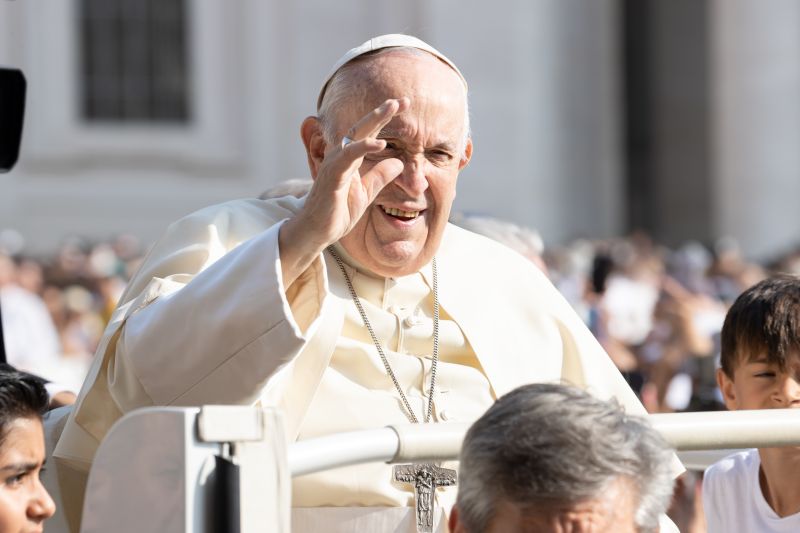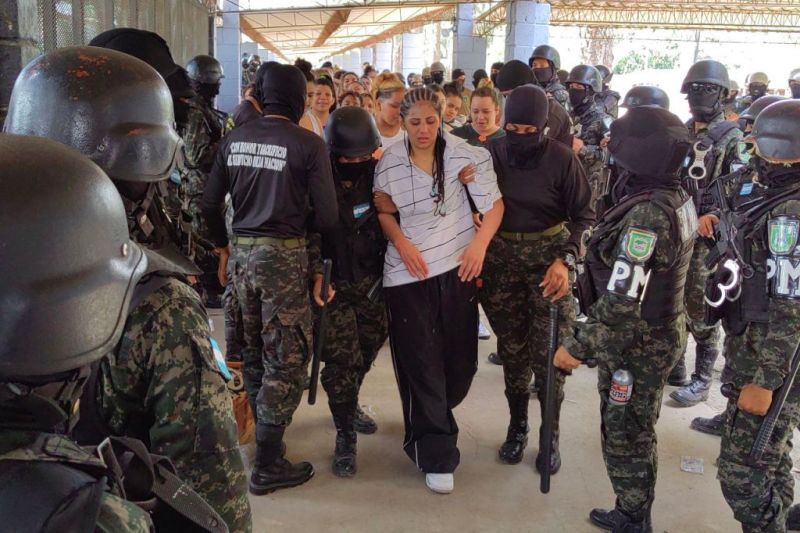 Pope Francis at the general audience in St. Peter’s Square on June 28, 2023. / Daniel Ibanez/CNA
Pope Francis at the general audience in St. Peter’s Square on June 28, 2023. / Daniel Ibanez/CNA
Vatican City, Jun 28, 2023 / 05:03 am (CNA).
At his first general audience in three weeks, Pope Francis praised the evangelization efforts of St. Mary MacKillop, a religious sister who devoted her life to providing Catholic education to the poor in rural Australia.
“Mary MacKillop was convinced that the purpose of education is the integral development of the person both as an individual and as a member of the community; and that this requires wisdom, patience and charity on the part of every teacher,” the pope said in a hot St. Peter’s Square on June 28.
Commenting on the late June weather, Francis asked pilgrims at the start of the event “to be a little patient today in this heat.”
“Thank you for coming in this heat, with this sunshine, thank you so much for your visit,” he added.
Pope Francis held his usual weekly audience for the first time since June 7, the morning of the day he underwent a three-hour abdominal surgery under anesthesia to correct an incisional hernia.
Last week’s public audience was canceled to allow the pope more time to recover from surgery. In July the weekly audience is canceled for a summer break. It will resume on Aug. 9, after Pope Francis returns from a visit to Portugal for World Youth Day 2023 in Lisbon.
Continuing a series of lessons on apostolic zeal, Pope Francis on Wednesday highlighted Australia’s first and only Catholic saint: Mary MacKillop.
MacKillop was the first of eight children born to Scottish immigrants in 1842, in what is now known as Melbourne. At the time, the European settlement in Australia had been established for a little over 50 years.
MacKillop, whose family had its own economic problems, dreamed of offering free education to Australia’s Catholic rural poor.
With the help of her spiritual director and mentor, she developed a plan for a congregation of sisters to aid those in need in Australia’s vast countryside. She took the religious name St. Mary of the Cross, and founded what would go on to be the Congregation of the Sisters of St. Joseph of the Sacred Heart.
MacKillop’s sisters established many schools and orphanages across Australia, including in the “bush.”
Pope Francis said MacKillop believed Catholic education was also “a great form of evangelization.”
“Indeed, education does not consist of filling the head with ideas, just this no,” he said. “In what does education consist? In accompanying and encouraging students on the path of human and spiritual growth, showing them how friendship with the Risen Jesus expands the heart and makes life more human.”
“To educate is to help to think well; to feel well — the language of the heart; and to do well — the language of the hands,” Francis continued. “This vision is fully relevant today…”
The pope noted that MacKillop did not, however, have an easy path to fulfilling her mission of sharing the Good News with those in need.
“You see: all the saints have found opposition, even within the Church,” he explained.
MacKillop “had to pay bills, negotiate with local bishops and priests, manage the schools and look after the professional and spiritual formation of her sisters; and, later, she suffered health problems. Yet, through it all, she remained calm, patiently carrying the cross that is an integral part of the mission,” he said.
“Mary,” Pope Francis emphasized, “had great faith in God’s Providence: she was always confident that in any situation God provides.”
The pope also underlined the saint’s great care for the poor and marginalized, which pushed her “to go where others would not or could not go.”
“This is very important,” he said. “On the road to holiness, which is the Christian road, the poor and the marginalized are protagonists, and a person cannot move forward in holiness unless he also devotes himself to them in one way or another. They, who need the Lord’s help, carry the presence of the Lord.”
Francis recalled being struck once by a line he read that said: “the protagonist of the story is the beggar: beggars are those who draw attention to injustice, which is the great poverty in the world.”
He also lamented that money is spent on making weapons instead of on producing food.
“Don’t forget: there is no holiness if, in one way or another, there is no care for the poor, for the needy, for those who are somewhat on the margins of society,” he said.
[…]




